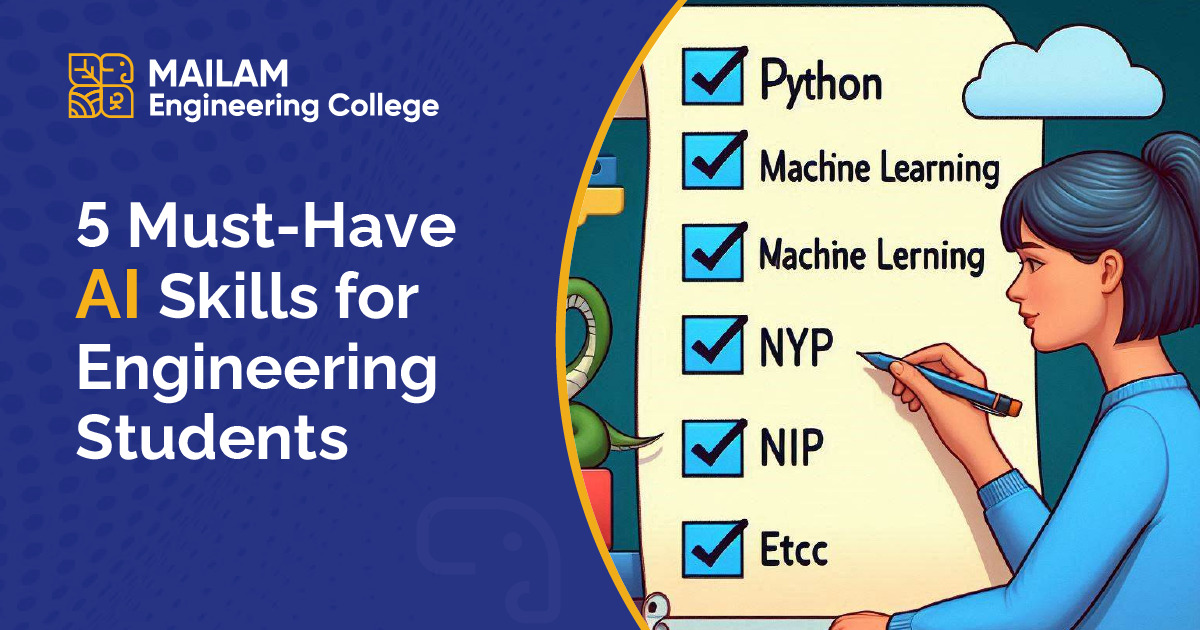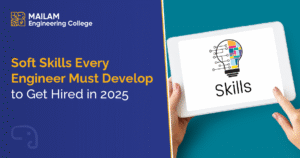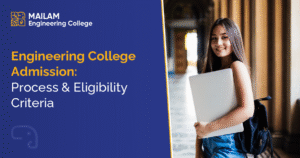Introduction
Engineering has changed over the decades and is changing in the present day at breathtaking speed. We are no more building machines or merely writing code; we are now, in fact, busy creating intelligent systems that learn, adapt, and evolve. Artificial Intelligence (AI) is transforming the way we solve problems in whichever discipline, computer science to mechanical, electronics to civil engineering. Smart technologies are creating a paradigm shift within all industries. Hence, people need to master the essentials of AI . Corporate recruiters are now striving to identify those graduates who not only grasp the core tenets of engineering but are also well-versed in AI. So which ai skills for engineering students would give you the upper hand? Let’s find out.
| Did You Know? Artificial Intelligence will increase the coffers of world economies by about $15.7 trillion.AI smoothly fits into sectors like healthcare and automotive, where manufacturing engineers actively contribute to its transformation! |
Why Learn AI For Engineering Students?
AI learning for engineering students will develop tools, systems, and machines capable of thinking, learning, and deciding, which can add great value to their job market. Now that AI is, essentially, more than a buzzword; it is the form of state-of-the-art innovation by which engineers today work with AI to:
- Design products using predictive algorithms.
- Automate intelligent manufacturing.
- Provide AI-driven diagnostics.
- Make infrastructure with predictive maintenance through smart cities.
5 Must-Have AI Skills For Engineering Students
1. Python Programming
This has made Python the most favorable language among AI specialists, due to its simple nature and ease of readability with an equally competitive proprietary ecosystem. Being simple, it also helps engineering students just step into AI.
Key Concepts To Learn:
- NumPy and Pandas for data manipulation;
- Matplotlib and Seaborn for data visualization;
- Scikit-learn-for machine learning algorithms;
- TensorFlow and PyTorch-for building neural networks;
2. Machine Learning (ML) Fundamentals
Listening with machines was machine learning. It’s learning, but it’s not programmed. Doors are opened for predictive systems and smart automation. In this way, the knowledge of ML is making its mark among its engineers and pushing the boundaries of creation-nonself-correction systems to smart quality control systems in factories.
Key Concepts To Learn:
- Supervised & Unsupervised Learning
- Regression & Classification
- Overfitting & Underfitting
- Cross-Validation Methods
- Model Accuracy Metrics (Precision, Recall, F1 Score)
3. Data Preprocessing And Analysis
Starting from the raw data, the insights extraction or model training would require processing and structuring of the data. It is an important stepping stone in any AI pipeline. This skill is essential in areas such as civil or mechanical engineering, where sensor and environmental data are abundant.
Key Concepts To Learn:
- Data Cleaning entails, deleting, removing duplicates, and correcting errors.
- Selection & Engineering of Features- Making the input variables meaningful.
- The normalization and standardization processes.
- Dimensionality Reduction- Techniques like PCA and t-SNE for high-volume data.
4. Neural Networks & Deep Learning
Indeed, deep learning is a form under the vast canopy of artificial intelligence that involves achieving the brain’s structure and functionality. Now, multiple technologies have been developed to understand human behavior-from facial recognition to self-driving cars and voice assistants. For all engineering students, sound advancements can be made in intelligent robotics, integration with IoT, and even simulating assistance in AI.
Key Concepts To Learn:
- Artificial Neuron and Activation Function
- Convolutional Neural Networks (CNN): Image Analysis
- Repeating Neural Networks: Sequence Modeling.
- Backpropagation: Training the Models
- Transfer Learning: Applying Pretrained Models to New Problems
5. AI Ethics & Practical Implementation
AI, indeed, is mighty, and great power comes with great responsibility. An engineer must make it vibrant for all through the ethics, fairness, and safety of an AI system. Such skills are essential for designing functional, responsible, and impactful AI solutions.
Key Concepts To Learn:
- Bias and Fairness – An AI should not be discriminatory;
- Transparency – How decisions are made about;
- Data Privacy – The utmost shielding of user information for protection; and
- Accountability – Who is responsible for AI errors
Renowned Practical AI projects:
- Predictive maintenance systems for factories;
- Autonomous robots for construction; and
- AI-powered traffic management systems.
Mailam Engineering College: AI-Ready
It is at Mailam Engineering College where we believe that future engineering has to be powered by AI. Every concept that finds itself in a core branch is placed together: on the one side, it is built with the help of AI, hands-on projects, and industry-oriented training. The mission is to arm the students with the technical know-how, weapons, and AI that will enable them to shape the world of tomorrow. Please anchor with us future-ready with a focus on industry.
Conclusion
Engineers who see beyond blueprints and codes will own the future. If you are interested in designing smarter machines or better cities, offering AI knowledge to engineering students will become important and not just a bonus. By mastering these five skill sets, from Python to deep learning-you’ll be ready to tackle challenges in a myriad of industries and roles. So if you are ready, let’s AI-up your engineering career for the future!
FAQs On AI For Engineering Students
1. What is the advantage of studying AI for engineering students?
With the rise of smart, adaptive systems, engineers can structure such systems to do intelligent and automatic movements, predictions, and very complicated problem solutions, which is very much a necessity in this modern automated world.
2. Are other engineering students, such as plumbing, electrical, and others, able to learn AI?
Definitely! AI is an interdisciplinary science. Mechanical, electrical, civil, and all other branches can apply AI to robotics, smart sensors, automation, and urban planning.
3. What should I begin with in AI?
Begin with Python, afterwards, and look at tools such as Scikit-learn, TensorFlow, and PyTorch. Also, practice on Google Colab and download Jupyter for your personal use.
4. Is AI quite complex for a beginner?
AI is very much accessible with regular practice. It would help if you could access online materials and MOOCs and attend workshops at colleges to set firm ground in AI, even if you do not have prior experience with programming.
5. Is there anything offered at Mailam Engineering College for learning AI?
Yes. Mailam Engineering College offers AI-integrated modules, intensive workshop activities, and interdisciplinary projects that involve different engineering streams to help give their students an edge above the rest.







